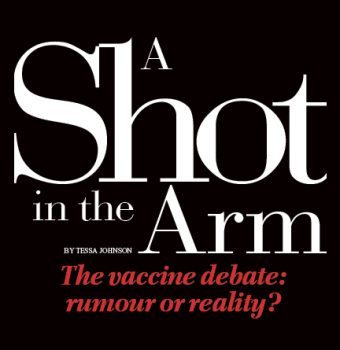
The vaccine debate: rumour or reality?
As measles, mumps and whooping cough outbreaks continue to be reported across Canada and the United States, celebrity mom Jenny McCarthy, who has long been outspoken about linking vaccines to autism, is taking a step back say she’s not against immunizing but believes parents have the right to choose one poke per visit.
Meanwhile in her newly released book, The Kind Mama: A Simple Guide to Supercharged Fertility, a Radiant Pregnancy, a Sweeter Birth, and a Healthier, More Beautiful Beginning, Clueless star Alicia Silverstone says babies don’t need diapers, not using a family bed is equivalent to neglecting your child and, no surprise, she joins the anti-vaxxers, writing, “While there has not been a conclusive study of the negative effects of such a rigorous one-size-fits-all, shoot- ’em-up schedule, there is increasing anecdotal evidence from doctors who have gotten distressed phone calls from parents claiming their child was ‘never the same’ after receiving a vaccine. And I personally have friends whose babies were drastically affected in this way.”
As sophisticated as we are at being informed, a celebrity’s status (and mommy bloggers galore) apparently have a certain level of influence on some of us. And now, thanks to the decisions of these vaccine-fearing parents, the pretty-much-extinct diseases our parents and grandparents feared are making a comeback.
I spoke with Dr. Nicola Mercer, the medical officer of health and CEO of Wellington-Dufferin-Guelph Public Health, to get some perspective.
Can you please elaborate on the scientific evidence which proves vaccinations are safe?
Vaccines are safe and effective and protect your children from many diseases that can cause severe illness and even death. There is strong scientific evidence that vaccines are safe based on decades of study and observation. It might surprise some parents to know the extent of testing that is completed before any vaccine is made available including years of research, clinical trials and a strict approval process. Vaccines are approved only when they meet acceptable standards of production, safety and potency. All stages of production must meet strict standards of safety, sterility and quality control.
Is it okay for parents to delay a child’s vaccination schedule? What are the potential dangers if parents choose this method?
Don’t delay immunization. It will put your child at unnecessary risk when they are most vulnerable. For example, vaccines are started at two months of age to protect children against pertussis (whooping cough) and HIB disease as early as possible in life. Children who are less than six months of age are most at risk of complications and death from pertussis. Children receive vaccinations in combinations to reduce the number of injections needed. Combining vaccines in one shot does not increase the risk of side effects or reduce a vaccine’s effectiveness.
How are physicians counteracting the “expert” advice parents are finding online?
An informed public is a healthier public. We encourage parents to check carefully the sources of information they find on the Internet. Does the website claim any medical information? If so, has that information been reviewed by experts? Are those experts named with their credentials, degrees and positions? Does the site provide sources from medical journals or other scientific reports? What is the source of this information? Is it current? Do you know when the information was posted or revised? If you wonder whether information is accurate you can always call your local public health office to find out.
What are the long-term effects of an unvaccinated child?
Many parents today are unfamiliar with the infections that used to make many children seriously ill and sometimes cause death. Rubella and diphtheria have been virtually eliminated as a result of immunization. Measles, mumps and pertussis (whooping cough) have all seen decreases of 90 to 98 percent. The most serious consequence of being unvaccinated is that your child remains susceptible to disease. If your child gets sick, they may experience complications such as pneumonia, brain damage, heart problems, skin infections, blindness, deafness and sometimes death.
Is it dangerous for kids to receive so many vaccinations at once?
No. This has been well studied. Every day our bodies come into contact with millions of germs, causing our immune system to work continuously to protect us. At present, infants receiving recommended vaccines starting at two months of age come into contact with only 34 of the disease-causing substances called antigens — just 34 antigens among the millions handled every day by our immune systems.
BY TESSA JOHNSON
PUBLISHED IN THE HEALTH & WELLNESS ISSUE/SUMMER 2014














































































































